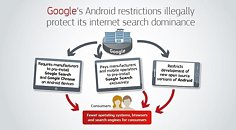Wednesday, July 18th 2018

Antitrust: European Commission Fines Google for Record €4.34 billion for Illegal Practices
It's a record-setting fine: the European Commission has officially ruled that Google must pay a fine of €4.34 billion for breaking antitrust laws, specifically related to the implementation of its services within the Android ecosystem. The three key areas within which the EC has found wrongdoings pertain to bundling of its search engine and Chrome apps into the operating system; blocking phone makers from creating devices that run forked versions of Android (claiming, without proof, that these versions would offer more security risks), and "made payments to certain large manufacturers and mobile network operators" to exclusively bundle the Google Search app on handsets.
Google now has 90 days to comply with the EC's decision (notwithstanding payment of the fine), which Google, obviously, has already announced will appeal the decision. In a statement to The Verge, a Google representative said that "Android has created more choice for everyone, not less. A vibrant ecosystem, rapid innovation, and lower prices are classic hallmarks of robust competition," and that Google "(...) will appeal the Commission's decision." The idea here seems to be to stop Google from forcing manufacturers to bundle their app and search software stacks - many times in a seemingly unremovable way. You can check the press release in the source link, but some of the more interesting snippets have been collated after the break.
Sources:
European Comission Press Release, via The Verge
Google now has 90 days to comply with the EC's decision (notwithstanding payment of the fine), which Google, obviously, has already announced will appeal the decision. In a statement to The Verge, a Google representative said that "Android has created more choice for everyone, not less. A vibrant ecosystem, rapid innovation, and lower prices are classic hallmarks of robust competition," and that Google "(...) will appeal the Commission's decision." The idea here seems to be to stop Google from forcing manufacturers to bundle their app and search software stacks - many times in a seemingly unremovable way. You can check the press release in the source link, but some of the more interesting snippets have been collated after the break.
Pre-installation can create a status quo bias. Users who find search and browser apps pre-installed on their devices are likely to stick to these apps. For example, the Commission has found evidence that the Google Search app is consistently used more on Android devices, where it is pre-installed, than on Windows Mobile devices, where users must download it. This also shows that users do not download competing apps in numbers that can offset the significant commercial advantage derived through pre-installation.
(...)
The Commission also assessed in detail Google's arguments that the tying of the Google Search app and Chrome browser were necessary, in particular to allow Google to monetise its investment in Android, and concluded that these arguments were not well founded. Google achieves billions of dollars in annual revenues with the Google Play Store alone, it collects a lot of data that is valuable to Google's search and advertising business from Android devices, and it would still have benefited from a significant stream of revenue from search advertising without the restrictions.
(...)
Google granted significant financial incentives to some of the largest device manufacturers as well as mobile network operators on condition that they exclusively pre-installed Google Search across their entire portfolio of Android devices. This harmed competition by significantly reducing their incentives to pre-install competing search apps.
(...)
The effects of Google's illegal practices
The Commission decision concludes that these three types of abuse form part of an overall strategy by Google to cement its dominance in general internet search, at a time when the importance of mobile internet was growing significantly.
First, Google's practices have denied rival search engines the possibility to compete on the merits. The tying practices ensured the pre-installation of Google's search engine and browser on practically all Google Android devices and the exclusivity payments strongly reduced the incentive to pre-install competing search engines. Google also obstructed the development of Android forks, which could have provided a platform for rival search engines to gain traffic. Google's strategy has also prevented rival search engines from collecting more data from smart mobile devices, including search and mobile location data, which helped Google to cement its dominance as a search engine.
Furthermore, Google's practices also harmed competition and further innovation in the wider mobile space, beyond just internet search. That's because they prevented other mobile browsers from competing effectively with the pre-installed Google Chrome browser. Finally, Google obstructed the development of Android forks, which could have provided a platform also for other app developers to thrive.
Consequences of the decision
The Commission's fine of €4 342 865 000 takes account of the duration and gravity of the infringement.


53 Comments on Antitrust: European Commission Fines Google for Record €4.34 billion for Illegal Practices
Still, this is yet another sample of bureaucracy at its finest: fining Google for stifling innovation. Maybe Google should exit EU and let us deal solely with Apple. Then we'll have tons of smartphone models to pick from. :wtf:
Off topic: 2008 crash was due to greedy bankers "innovating". Or FCC dropping net neutrality to support "competition".
And it's not the same as Windows-IE, because while IE was actually embedded into Windows, Google's apps come in a separate package from the OS. And let's be brutally honest about it: what other browser makes for a nice default on Android?
The accusation about barring producers from using other OSes also seems a bit strange. Off the top of my head I can tell at least HTC has been building both Android and Windows Phone smartphones for a while. Also, Nokia took several bn dollars from Microsoft to use their OS exclusively.
TO me it just looks like every few years the EU levies fines as if they want to balance our trading deficit or technological retardation.
gs.statcounter.com/os-market-share/mobile/worldwide/#monthly-201706-201806-bar
But that was the case with Windows-IE. As I have written above, Android-Google Apps is not like that.
The fine seems excessive, though. Unless Google has been given the chance to fix these before and didn't act on it. I don't recall the press writing about anything like that.
I had a bigger problem with the POS program "Bixby" that Samsung shoved in your face. Crappy software that was designed to integrate into pretty much everything you did on your phone.
If you take a picture, you get a pop up about how Bixby can help do other things with the pictures you take. Want to send a text message - Bixby can do other things with your text messages! Wish to edit a photo/video....Bixby can! Oh...you pressed the oddly placed button the left side of the phone that wasn't your volume....you poor SOB, that's the Bixby button! Bixby here! What do you want? What can I do! I'm Bixby....look at me....LOOK AT ME, USE ME AND LOVE ME!
I hate Bixby. Stupid ass program.....stupid Samsung and their Bixby.
The EU is seemingly headed into a direction I very much like: they are setting the bar for how we use data and new technology, and define where companies cross the line. Even though we will never see a penny of this 4.34 billion, this is a perfect scare tactic for others.
I like the Google counter too: 'more choice for everyone'. How would you like your bar-shaped phone sir? With Google, Google, or some extra Google? If you want the extra Google, here's a Pixel. Otherwise you're free to pick any of the other Google phones but beware, some manufacturers add their own skin on top which makes everything slow!
The silliest thing of it all is that Google doesn't even NEED to push its own apps and search because in many cases, it is one of the best choices that a user will default to regardless. How different it was with MS and IE...Great, and I like trucks :p:kookoo:
I dont have illusions that this is done for customers. :D Its done so someone could have money from something they never worked on.. Government theft, if you like..
Google has more power over the open-source Android than Microsoft has over the closed-source Windows, Ars wrote great article on this subject a few years ago.
As far as forks not being allowed, they're also within their right to block it. Google may want control, but security from their perspective makes sense. Google can provide all the updates in the world, but they can't make OEMs do shit (so much for all that control). Adding forks to the equation means even less updates and more vulnerabilities. Who knows what the idiots would break on top of it.
Guess who would get blamed from a fork allowing a massive data breach or phone destroying malware? If OEMs want to fork, then they can just make gapp clones and stfu.
I know I don't want any of their garbage. I want vanilla and I'll mod it myself. Even inbred Joe 6 pack wants vanilla.
Most OEMs skin Android ad nauseum and even default to their own internet browsers as opposed to Google chrome, which I immediately install on every Android phone as soon as I get it out of the box as it is much better than the default browser Samsung includes with their phones.
Idk how the EU can slap such a big fine for Google including their search engine by default in Android, the search engine can be changed easily in the settings, and honestly, other search engines are not as good as Google's...
I hope Google can appeal this decision, I'm pretty sure none of the money collected by the EU will directly benefit any real users of Android based phones anyway, please correct me if I'm wrong
I think the whole point is one view isn't the world's.